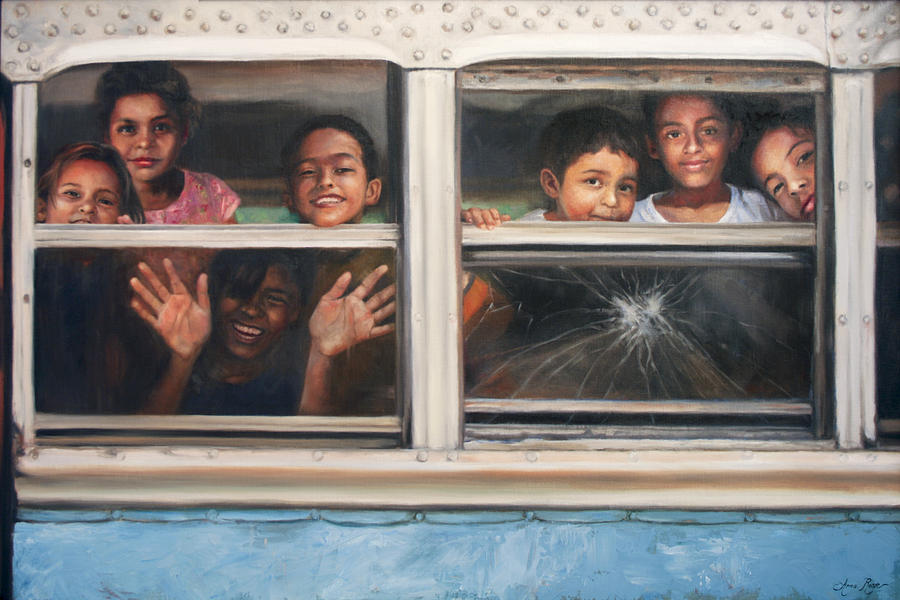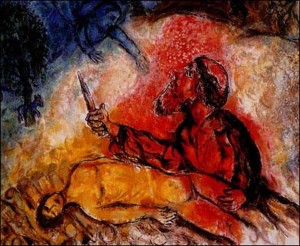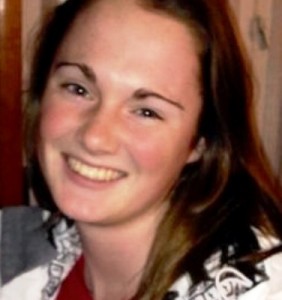(This is the sermon I preached at the Hermitage on September 7, 2014. The scriptures were Exodus 12:1-14 and Romans 13:8-14. Enjoy!)
Milo, the hero in Norman Juster’s book, The Phantom Tollbooth, finds himself on a fantastic journey in a strange land to rescue two princesses. He and his companions must go through extraordinary and sometimes dangerous territories to reach the mountains where the princesses are held captive.
On their way, they pass through the empty city of Reality, which is nothing but an open space. Milo’s new friend Alec explains why nothing in the city exists any longer: “Many years ago, on this very spot, there was a beautiful city of fine houses and inviting spaces, and no one who lived here was ever in a hurry. The streets were full of wonderful things to see and the people would often stop to look at them….
“….as you know, the most important reason for going from one place to another is to see what’s in between, and they took great pleasure in doing just that. Then one day someone discovered that if you walked as fast as possible and looked at nothing but your shoes you would arrive at your destination much more quickly. Soon everyone was doing it. They all rushed down the avenues and hurried along the boulevards seeing nothing of the wonders and beauties of their city as they went….
“….No one paid any attention to how things looked, and as they moved faster and faster everything grew uglier and dirtier, and as everything grew uglier and dirtier they moved faster and faster, and at last a very strange thing began to happen. Because nobody cared, the city slowly began to disappear. Day by day the buildings grew fainter and fainter, and the streets faded away, until at last it was entirely invisible. There was nothing to see at all.”
We have heard it said, “Life is a journey, not a destination.” That quote is often attributed to Ralph Waldo Emerson, but was actually written by the theologian Lynn Hough in 1920. Many of our more memorable and life-changing stories and mythology stems from the archetype of The Journey – an understanding that who we are isn’t defined by what we are aiming at, but by how we get there and who comes along for the ride. Today’s scripture acknowledges this bit of wisdom.
We have before us two groups of people at the beginning of a journey, on the cusp of becoming who they are meant to be. The people of Israel, enslaved in Egypt for hundreds of years, have all but lost hope of that God remembered them. In one night everything changes, the people of Israel transform from Egyptian slaves into God’s Chosen Ones on the way to the Promised Land. One night – a night they are told they will celebrate for years to come; their birthday; their New Years Day; the day they become a nation.
The Christian church began its journey at Pentecost, a season which we are still celebrating. However, our journey was supposed to be a quick trip. Jesus said he’d be back soon – there were people still alive during this time who remembered it. But as time went on, Paul and others like him had some explaining to do. Jesus didn’t return, the apostles were martyred, the church persecuted, and Rome was still in charge. Here we are, two thousand years later, still pregnant with a promise of the Kingdom that has yet to appear.
We are still on the journey – and like the Israelites rushing out into a wilderness, looking for a Promised Land with only the shoes on our feet and the staff in our hands and the memories of our last meal behind us, we don’t have a map or even a signpost telling us how far off the mark we really are.
Ralph Waldo Emerson has also been attributed to this quote: “I will not follow where the path may lead, but I will go where there is no path, and I will leave a trail.” Sadly, he didn’t write that one either. It was poet Muriel Strode in her 1903 poem, “Wind-Wafted Wildflowers.” Poor Ralph. He can’t seem to get a break in this sermon.
The path that already exists lies behind us – it inevitably leads back to lead back to Egypt, it leads to what we once were and are no longer. What is required of us is what was required of the Israelites the morning after the first Passover, and what was require of the stunned apostles the day following the Pentecost: to blaze a trail in a new land toward a destination we know not.
We are never what we once were. We are always becoming something more or something less than. We live with one foot in the past and one foot in the future, precariously balanced in the present as on a gossamer thread, knowing the only way is forward, hoping for a hand to hold as we make the treacherous journey into our future. It’s dark, the dawn is ever-breaking but never fully risen. We are in the time between, wandering around a promise that has yet to be fully realized. Love is our only guide.
Yes, that’s right, we do have a map. Admittedly it’s not a very coherent map, but it is the only one we have. The people of Israel weren’t released into the desert alone. They had God as their pillar, guiding them – but even more so, they had the Torah, the law given to Moses by God to guide their steps. Paul repeats what Jesus repeats from Leviticus chapter 19: that the entirely of the Law is summed up in these words, “Love your neighbor as you love yourself.” Love is our map.
God not only directs the children of Israel how to perform the very first Passover in Egypt, but God also lets them know that they will celebrate it every year after – never again as slaves to the Egyptians. The people of Israel have been celebrating that Passover birthday for over 5,000 years. They celebrated it in the wilderness, they celebrated it in the Promised Land. When Israel fell to the Assyrians and the Greeks and the Romans, they still celebrated their freedom. When forced to live as traveling merchants in medieval Europe, they celebrated. During the Spanish Inquisition, they celebrated. When Adolph Hitler and Joseph Stalin persecuted, imprisoned, and gassed them, they celebrated their God-given freedom. They became free from their slavery in Egypt and free they remain, no matter when or where they are.
As we continue living in Pentecost, love continues to be our map no matter when or where we are. While it may seem simple, love is anything but. It’s not one-size-fits-all. It’s not a pie in the sky love – it’s down in the dirt love that gets us through. Love has as many faces as people do. Showing love to one person might be enabling to another, might be mercy to someone else, might be humiliation to yet another. It’s tricky and it’s messy. It takes time and energy and planning. And sometimes we get it wrong. The church, just like each of us, gets off track, gets lost on the way to the Kingdom, and we lose some folks along the way. Still, love beckons – asks us to include those we fear, give all we have without expecting anything in return, forgive even when not asked, release every grievance that burdens us, so that we can continue the journey. Love helps us find our way back.
Two thousand years later and we still are wandering. But as J. R. R. Tolkien says in The Lord of the Rings, “Not all who wander are lost.” We are on a journey whose destination will not be realized in this generation. So let’s enjoy the view before it disappears. Let us love those who are with us, while they are here, invite more to travel along. Let us rest and enjoy each other’s company without bickering, without an anxious desire to get moving again. Let us release those petty grudges and bitterness of what was, so we can lighten our load for the mountains ahead. We’ve still got a ways to go and a trail to cut for those who come behind us. There is more work ahead just as there are more songs to be sung and more wild flowers to enjoy along the way.
Amen.



Average Rating